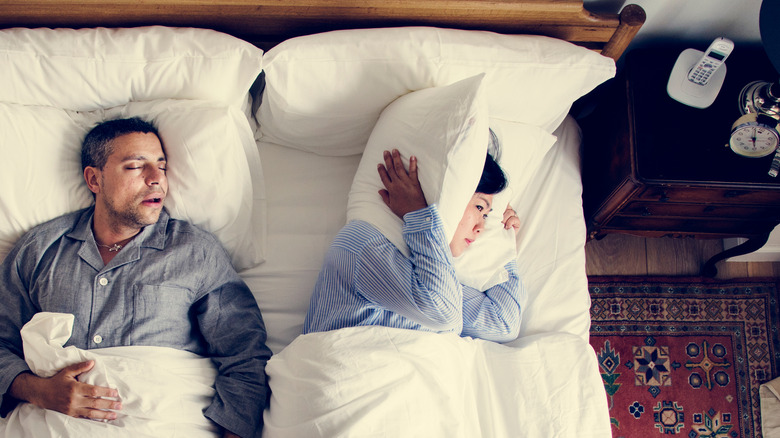The idea of sleeping next to someone you love has been so romanticized that single people everywhere dream of waking up next to that special someone. And yet, a quarter of modern couples say “It’s not all it’s chalked up to be,” as they happily tuck themselves into separate beds (per Newsweek). While sharing a bed with your partner is typical in modern society, it was once highly discouraged — and not for the reasons you might suspect.
Physicians of the Victorian era advised against catching zzz’s in a shared bed, insisting that the stronger of the pair would be leached of their good health to the benefit of the weaker partner (per The Guardian). Dr. William Witty Hall went so far as to claim that those who sleep next to one another and breathe in their germs, “… will in the end fail in health and strength of limb and brain, and will die while yet their days are not all told.”
Today, there’s no one claiming that sleeping next to your partner will lead to your early demise. However, in a new Naturepedic study, couples who sleep separately claim to sleep better than they did when they slept beside their beloved, and even reported feeling less stressed. With more and more couples choosing to sleep apart — for a variety of reasons — let’s take a look at what happens to your body when you stop sleeping in bed next to your partner and choose to snooze separately.
Why sleeping apart might be good for your health

You probably know that if you get under a certain number of hours of sleep, you’re going to be an irritable partner, parent, or coworker the next day. And beyond having less patience, poor sleep can really harm your health. When you’re not sleeping 7 to 9 hours per night, you’re more likely to struggle with memory issues, experience mood changes, have difficulty concentrating, get into an accident, gain weight, develop heart disease, and have a weakened immune system (via Healthline). It can even increase your risk of early death, according to a 2010 meta-analysis. If you’re sleeping next to a snoring partner or getting awakened by differing sleep schedules, you’re more at risk for these potential effects.
If you’re worried about the state of your sleep, try sleeping separately from your partner and see if your sleep improves (via The Healthy). When your sleep improves, you could see improvements in other areas of your life too, like your mood or sex drive. And while it might sound counterintuitive, even your relationship could improve by not sleeping in bed with your partner.
But is sleeping alone really better for you than sleeping next to someone you love? The Naturepedic study found that couples reported better sleep when snoozing separately from their partner, but that couples who slept alongside their partners reported healthier sex lives and more happiness in their relationships. How do you know which one is better for your relationship?
Can co-sleeping improve your health?
According to the Naturepedic study, respondents claim that they choose to sleep separately for a number of reasons, with the most common being a snoring partner or conflicting sleep schedules. Dr. Henning Johannes Drews, a psychiatry professor and lead author of a 2024 sleep study says that if sleeping next to your partner hinders your sleep, by all means, you should sleep alone (per Healthline). However, his study, among many others, has proven that sleeping next to a partner can actually improve sleep quality and overall health.
Drew and his team found that when couples slept beside each other, they not only experienced fewer sleep disruptions than when they slept separately, but an improvement in their quality of rapid-eye movement (REM) sleep. And the benefits of cosleeping don’t stop when you get out of bed. A 2005 study published in Biological Psychology found that women who cuddled with their partners had higher levels of oxytocin — aka the love hormone — and lower blood pressure. Leesa reports that people who co-sleep also release less of the stress hormone cortisol, causing a reduction in inflammation.
Sleeping with your partner improves your health, as well as intimacy within the relationship, literally synchronizing your heart rhythms, according to the National Sleep Foundation. Couples who sleep in the same bed experience a more fulfilling sex life and a happier relationship than those who sleep apart. But you have to do what’s right for you, your partner, and your relationship.